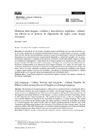Please use this identifier to cite or link to this item:
https://accedacris.ulpgc.es/jspui/handle/10553/71837
| Title: | Distancia entre lenguas / culturas y transferencia lingüística / cultural: sus efectos en el proceso de adquisición del inglés como lengua extranjera | Other Titles: | Language / Culture Distance and Linguistic / Cultural Transfer: Its Effects in the Learning Process of English as a Foreign Language | Authors: | Clouet , Richard | UNESCO Clasification: | 570111 Enseñanza de lenguas | Keywords: | Linguistic Transfer Cultural Transfer Linguistic Distance Cultural Distance Interlanguage, et al |
Issue Date: | 2018 | Journal: | Didactica-Lengua Y Literatura | Abstract: | The learning of a foreign language is influenced by a number of factors including the effects of the distance between the source language and culture, and the target language and culture. In this article our aim is to highlight the fact that successful acquisition will depend on the characteristics of the linguistic and cultural behaviour of the learners, as well as on their associative knowledge related to their linguistic and cultural background. This empirical study focuses on the cross-linguistic and cross-cultural influence of Spanish on the acquisition of English as a foreign language. The central objective is to observe if the mother tongue and culture promote or hinder the acquisition of English as a second language. The subjects in this study are Spanish-speaking students in the first year of the Translation and Interpreting Degree at the University of Las Palmas de Gran Canaria, Spain. The data analysed confirms that while the perception of similarities between languages and cultures can facilitate learning, language and culture transfer may cause non-native forms (errors) to occur. El aprendizaje de una lengua extranjera aparece mediatizado por una serie de factores entre los cuales destacamos la distancia existente entre la lengua y cultura origen y la lengua y cultura meta. En este artículo nuestra pretensión consiste en poner en evidencia que el éxito de la adquisición dependerá de las características del comportamiento lingüístico y cultural del aprendiz y de sus preconocimientos lingüísticos y culturales en los procesos asociativos. El presente estudio empírico se centra en la influencia interlingüística e intercultural de la lengua española en la adquisición del inglés como lengua extranjera. El objetivo central es determinar si la lengua y la cultura materna influyen favorablemente o negativamente en la adquisición de la lengua extranjera. Los sujetos de este estudio son estudiantes hispanófonos del Grado en Traducción e Interpretación de la Universidad de Las Palmas de Gran Canaria. Los datos analizados confirman que mientras la percepción de similitudes entre lenguas y culturas puede facilitar el proceso de enseñanza / aprendizaje, la transferencia lingüística y cultural también puede ser el origen de errores incomprensibles por un hablante nativo. |
URI: | https://accedacris.ulpgc.es/handle/10553/71837 | ISSN: | 1130-0531 | DOI: | 10.5209/DIDA.61954 | Source: | Didactica-Lengua Y Literatura [ISSN 1130-0531], v. 30, p. 57-72, (2018) |
| Appears in Collections: | Artículos |
WEB OF SCIENCETM
Citations
2
checked on Mar 1, 2026
Page view(s) 1
931
checked on Jan 16, 2026
Download(s)
814
checked on Jan 16, 2026
Google ScholarTM
Check
Altmetric
Share
Export metadata
Items in accedaCRIS are protected by copyright, with all rights reserved, unless otherwise indicated.
